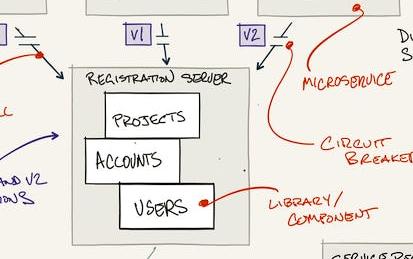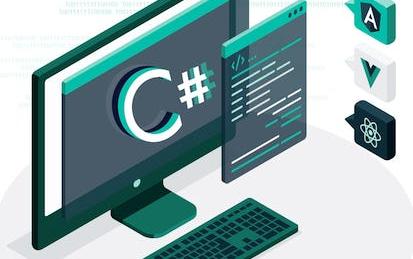

دوراتنا

Software Construction: Object-Oriented Design
Learn how to design large software systems that solve real-world problems using object-oriented design techniques.
-
Course by

-
 Self Paced
Self Paced
-
 الإنجليزية
الإنجليزية

Software Architecture for Big Data
This specialization is for software engineers interested in the principles of building and architecting large software systems that use big data. Through three courses you will learn about how to build and architect performant distributed systems from industry experts at Initial Capacity. This specialization can be taken for academic credit as part of CU Boulder’s MS in Data Science or MS in Computer Science degrees offered on the Coursera platform. These fully accredited graduate degrees offer targeted courses, short 8-week sessions, and pay-as-you-go tuition.
-
Course by

-
 Self Paced
Self Paced
-
 الإنجليزية
الإنجليزية

Software Engineering
Software development is not just about coding, it also involves the application of scientific knowledge and well-defined engineering techniques to produce maintainable, scalable, cost-effective and on-schedule software products. This specialization covers software engineering methodologies, techniques, and tools for planning, capturing requirements, designing, implementing, testing, and maintaining large-scale software systems.
-
Course by

-
 Self Paced
Self Paced
-
 الإنجليزية
الإنجليزية

Securing Software, Data and End Points
Course 4: Securing Software, Data and End Points
-
Course by

-
 Self Paced
Self Paced
-
 8 ساعات
8 ساعات
-
 الإنجليزية
الإنجليزية

Software Architecture Patterns for Big Data
The course is intended for individuals looking to understand the architecture patterns necessary to take large software systems that make use of big data to production. You will transform big data prototypes into high quality tested production software. After measuring the performance characteristics of distributed systems, you will identify trouble areas and implement scalable solutions to improve performance.
-
Course by

-
 Self Paced
Self Paced
-
 49 ساعات
49 ساعات
-
 الإنجليزية
الإنجليزية

Fundamentals of Software Architecture for Big Data
The course is intended for individuals looking to understand the basics of software engineering as they relate to building large software systems that leverage big data. You will be introduced to software engineering concepts necessary to build and scale large, data intensive, distributed systems.
-
Course by

-
 Self Paced
Self Paced
-
 43 ساعات
43 ساعات
-
 الإنجليزية
الإنجليزية

Software Engineering: Modeling Software Systems using UML
Software Development Life Cycle (SDLC) is the process of developing software through planning, requirement analysis, design, implementation, testing, and maintenance. This course focuses on the requirement analysis phase of SDLC, and you will learn how to use UML models to capture the system requirements and to facilitate communication between client/users and developers. UML is a general purpose visual modeling language for systems. It can be used to highlight different aspects of the system that are of interest to different stakeholders.
-
Course by

-
 Self Paced
Self Paced
-
 28 ساعات
28 ساعات
-
 الإنجليزية
الإنجليزية

System Validation: Automata and behavioural equivalences
Have you ever experienced software systems failing? Websites crash, calendar not synchronising, or even a power blackout. Of course you have! But did you know that many of these errors are the result of communication errors either within a system or between systems? Depending on the system, the impact of software failures can be huge, even resulting in massive economic damage or loss of lives. Software, and in particular the communication between software-intensive systems, is very complex and very difficult to get right.
-
Course by

-
 Self Paced
Self Paced
-
 4 ساعات
4 ساعات
-
 الإنجليزية
الإنجليزية

Software Engineering: Implementation and Testing
Software Development Life Cycle (SDLC) is the process of developing software through planning, requirement analysis, design, implementation, testing, and maintenance. This course focuses on the implementation and testing phases of SDLC, and you will examine different software development processes for large software systems development, and understand the strengths (pros) and weaknesses (cons) of different software development processes.
-
Course by

-
 Self Paced
Self Paced
-
 20 ساعات
20 ساعات
-
 الإنجليزية
الإنجليزية

Software Engineering: Software Design and Project Management
Software Development Life Cycle (SDLC) is the process of developing software through planning, requirement analysis, design, implementation, testing, and maintenance. This course focuses on the project planning and analysis/design phases of SDLC, and you will learn about different architectural patterns and design patterns to solve common problems in software design.
-
Course by

-
 Self Paced
Self Paced
-
 20 ساعات
20 ساعات
-
 الإنجليزية
الإنجليزية

Object Oriented Development using C#
Object-oriented programming is a widely utilized programming paradigm and one of the main technical skills required to land a software engineering position in any IT company. This course equips you with the required technical skills to design and develop high-quality object-oriented software systems using the C# programming language. The course focuses on the C# programming language since it is one of the most used programming languages in the industry.
-
Course by

-
 Self Paced
Self Paced
-
 18 ساعات
18 ساعات
-
 عربي
عربي

Software Security
This course we will explore the foundations of software security. We will consider important software vulnerabilities and attacks that exploit them -- such as buffer overflows, SQL injection, and session hijacking -- and we will consider defenses that prevent or mitigate these attacks, including advanced testing and program analysis techniques. Importantly, we take a "build security in" mentality, considering techniques at each phase of the development cycle that can be used to strengthen the security of software systems.
-
Course by

-
 Self Paced
Self Paced
-
 18 ساعات
18 ساعات
-
 الإنجليزية
الإنجليزية



